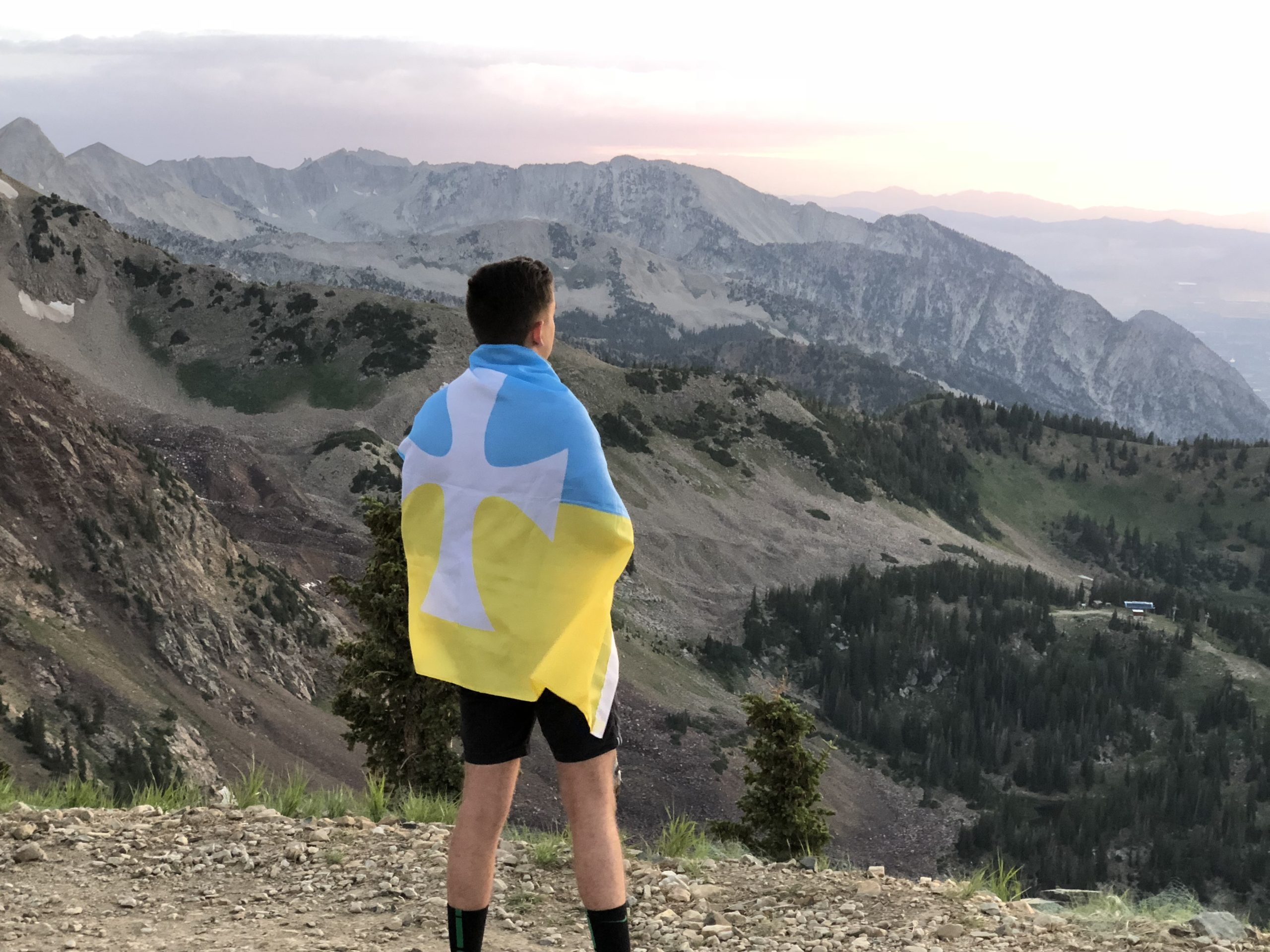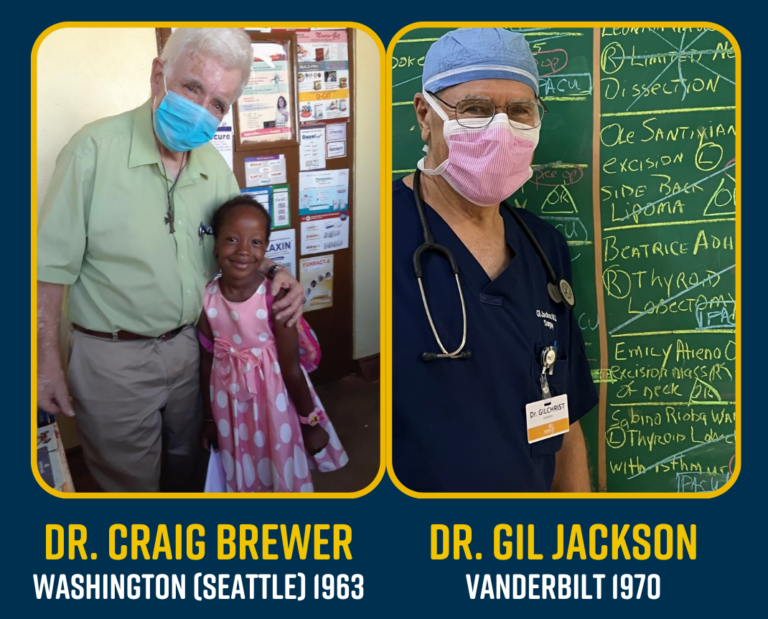Fraternity
- 1714 Hinman Ave. Evanston, IL 60201
- headquarters@sigmachi.org
- Directory

BY ASHLEY SZATALA
Two Sigma Chi doctors annually volunteer abroad in their commitment to global health equity

People in disadvantaged areas abroad often lack resources to obtain quality medical care, and in turn, the local doctors do their best with the resources they have to treat these patients. Doctors and health care professionals from around the world who volunteer in these areas provide much-needed health services, contribute to the medical knowledge of local doctors and medical staff, and assist in improving the resources available to these doctors and patients.
Those who volunteer gain a rewarding experience, the opportunity to understand a different culture and the ability to expand their network of like-minded professionals committed to global health equity.
Drs. Craig Brewer, WASHINGTON (SEATTLE) 1963, and Gil Jackson, VANDERBILT 1970, have been volunteering in Africa for several years to enhance the health care in underserved areas. For their efforts, they have been named this quarter’s Mark V. Anderson Character-in-Action Leadership AwardTM recipients.
ADDRESSING MEDICAL FUNDING, SICKLE CELL CRISES IN UGANDA
Brewer was getting ready to retire from private practice in the Seattle area in 2016 after a nearly 50-year career in family medicine when a fellow church member, whose parents were missionaries in Jordan, was collecting money and supplies for the Syrian refugees there. He contributed then inquired with the missionaries about volunteering his medical expertise to help the refugees. It turned out that it would be difficult to volunteer in Jordan on his own. So Brewer joined Samaritan’s Purse, which is a Christian humanitarian aid organization that sends medical professionals to partnering hospitals and clinics, among other services.
Through that organization and another one, he was able to volunteer in Jordan and Haiti before volunteering in Uganda beginning in 2019. It is in Uganda where Brewer has been working each year to make a difference in the local community.
Brewer lives with a family in Mukono, about an hour outside of Kampala, the capital. In Mukono, he volunteers in an outpatient clinic for a government hospital, where he also mentors medical students and staff.
"(Hospital staff) aren’t supported enough. The government hospital there is like it would be here, treating the underserved. Those people don’t have enough funds to buy all of the medicines that are prescribed. A certain amount of money is available for patients to get medicines for free from the government hospital pharmacy. The government budgets about four times as much as they are able to provide. If (a patient) went to the hospital and needed IV fluids, then (staff) would have the family go to the local drugstore pharmacy, buy IV fluids and tubing and bring it to the hospital to give to the patient."
Dr. Craig Brewer
“(Hospital staff) aren’t supported enough. The government hospital there is like it would be here, treating the underserved. Those people don’t have enough funds to buy all of the medicines that are prescribed,” Brewer says. “A certain amount of money is available for patients to get medicines for free from the government hospital pharmacy. The government budgets about four times as much as they are able to provide. If (a patient) went to the hospital and needed IV fluids, then (staff) would have the family go to the local drugstore pharmacy, buy IV fluids and tubing and bring it to the hospital to give to the patient.”
Due to this gap in funding for necessary medicines, Brewer started his own nonprofit, African Medical Funding Gap Relief Inc., in 2021 to help ensure patient access to medications. He also has been working to address sickle cell disease crises in Uganda. Sickle cell disease is a group of inherited red blood cell disorders where the red blood cells become misshapen and break down, according to the National Library of Medicine. The medical library adds that sickle cell disease leads to anemia and sickle cell crisis, which is characterized by severe acute pain and impaired end-organ function that often requires hospitalization.
“I remember having a medicine for vascular problems that was used for other purposes when I was in practice, and I thought this mechanism of action of the medicine has a good chance of working to help prevent sickle cell crises. And so, I pursued that work,” Brewer says.
He submitted a proposal to Uganda’s institutional review board for a clinical trial using the medicine to address sickle cell crises, but the board did not approve the proposal as it was written primarily due to Brewer’s lack of funding, he says. Brewer intends to still pursue it as an off-label trial, which won’t require an expensive clinical trial.
He next plans to travel to Uganda in the beginning of 2025.
PERFORMING SURGERIES IN KENYA, ETHIOPIA
Jackson has been a surgeon specializing in surgical oncology, endocrine surgery and head and neck surgery for over 40 years, but in his previous practice, he was too busy to take time off for a medical mission. Shortly after joining Houston Methodist Hospital in Texas in 2017, the chief of surgery there, who is also president of the American College of Surgeons (ACS), asked Jackson to get involved with the ACS’s program for equity in global surgery and help improve surgical access and education in medically underserved communities.
Two months after joining Houston Methodist, he went to Kenya to assist Tenwek Hospital in Bomet, located in the southwestern portion of the country. The hospital is a faith-based teaching and referral hospital that serves thousands of people each year, and there Jackson worked with the surgical residents, performed emergency surgeries and took on some complicated operations.

He’s since gone back to Kenya six more times — often with his wife, Katina, who assists at the clinics and in the local community any way she can — and volunteers through the Kenya Relief organization at Brase Medical Clinic in Migori, near the Tanzania border and Lake Victoria. Jackson was there as recently as June 2024 and, working with a medical team, saw about 300 patients and did about 60 surgical cases, usually taking out massive thyroid masses from patients who have lived with them for years. Many times, Jackson says, these patients with masses have been previously treated by local traditional healers who use unsanitary, ineffective methods for care, and patients come in with scarring.
“I’m grateful to still be practicing as a surgeon and helping people,” Jackson says. “It’s very rewarding work, and we do so much good for those who need it.”
Jackson and his wife also volunteer with a local orphanage in Migori, where they sponsor seven children. Katina Jackson is a senior associate athletics director at the University of Houston, and she’s assisted with the basketball program at the orphanage so that the children can benefit from the positive effects of sports and teamwork and also use those basketball skills to place into better high schools. The couple maintain a close relationship with the children they sponsor and often chat with them even when back home in Houston.
“It’s really wonderful to see them thrive at school,” Jackson says.
Since 2018, Jackson also has volunteered with the surgery residency training program at Hawassa University Hospital in Hawassa, Ethiopia, and has assisted with their capability to provide emergency and elective surgeries. He returned to the hospital in February 2024 to perform surgeries there and make rounds with the residents. He and some colleagues also embarked on a biomedical equipment enhancement project at the hospital, where they brought 12 trunks of biomedical equipment to give to the hospital and also show staff how to repair the equipment when it breaks down.
“We’re trying to make a long-lasting impact on patient care in southern Ethiopia,” Jackson says. “(Assisting the Hawassa University Hospital) has been really fun and rewarding. I’m fortunate to be able to do this work since joining the Houston Methodist Hospital.”
A person with good character shows trustworthiness, respect and fairness to others, as well as responsibility and citizenship. Those members who go out of their way to help others and those who overcome obstacles and lead with integrity are good candidates for the Mark V. Anderson Character-in-ActionTM Leadership Award.
Sigma Chi introduced the award to recognize the selfless acts of brothers. A formal recognition by the Fraternity allows non-members to appreciate the scope of the organization. For information about the award, see sigmachi.org/character.